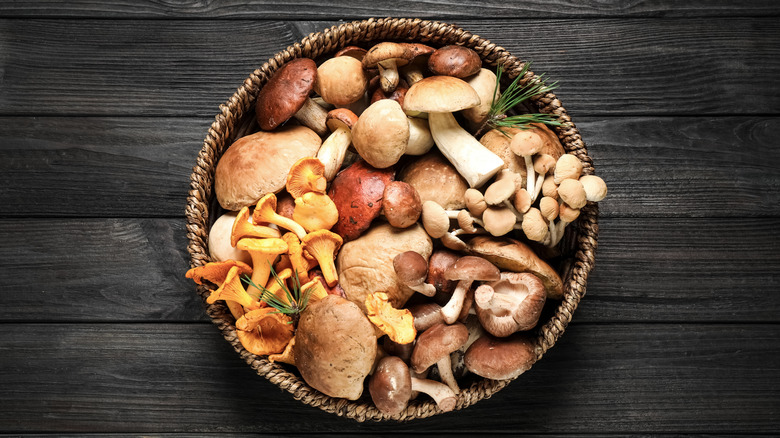There's Evidence This Vegetable Could Help Slow Down Aging
Mushrooms on your pizza, anyone? Or how about some mushroom soup? Whether you love these fungi as a regular part of your diet or prefer to steer clear of them, there's good reason for most of us to start eating more of them. These quiet culinary stars — classified as vegetables by the U.S. Department of Agriculture — boast impressively high levels of certain antioxidants that are associated with health-boosting and anti-aging properties.
Researchers at Penn State studied 13 different varieties of mushrooms and found that across the board, they contain high levels of two particular antioxidants, ergothioneine (ERGO) and glutathione (GSH). These are both thought to help counter the cell damage done by free radicals, which can accelerate aging as well as contribute to long-term health problems like heart disease, Alzheimer's disease, and even cancer (via The Healthy).
Study author Robert Beelman, PhD, told Men's Health, "Since mushrooms are a 'ball of fungi' they contain the highest amount [of ERGO], by far, in the human food chain. Many other foods contain quite small amounts of ERGO because it gets into the food chain via plants picking it up from fungi in the soil."
Mushrooms are a potent source of antioxidants
Mushrooms are such a concentrated source of these antioxidants that they contain nearly double the amount found in asparagus, the most potent vegetable source (via Men's Health). And while the amounts of ERGO and GSH do vary among mushroom species (with wild mushrooms, especially porcini, having the most), even humble white button mushrooms contain so much that eating just five of them a day fulfills your three-milligram recommended daily intake.
Not only that, but there is some evidence that the antioxidants found in mushrooms may not only stave off signs of physical aging, but protect mental health as well. Dr. Beelman says that "countries that have more ergothioneine in their diets—like France and Italy—also have lower incidences of neurodegenerative diseases, while people in countries like the United States, which has low amounts of ergothioneine in the diet, have a higher probability of diseases like Parkinson's and Alzheimer's" (via Well and Good).
A portobello burger for lunch sounds pretty good right now, doesn't it?


